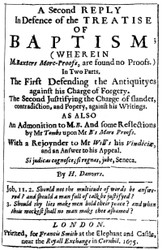Henry Danvers (ca.1619-1687/88) is the 9th essay in British Particular Baptists, Volume 1 Revised
1st May 2019
The relationship between church and state has always been one of tension. In the days of pagan Rome, when Christianity enjoyed no official status or legal recognition, the Apostle Paul preached submission (Rom. 13:1-7) and prayer for leaders (1 Tim. 2:1-2). Yet, even in the church’s infancy, the apostles never advocated absolute submission. When obedience to the governing authorities meant contravening the commands of God, the apostles said, “We ought to obey God rather than men” (Acts 5:29). This refusal to submit to authority when that authority commands the commission of sin or the omission of good, has resulted in the persecution of Christians throughout history. Even in times and locations where Christianity has enjoyed ascendancy, there have been endless quarrels within the church and between church and state as to correct polity and orthodox doctrine. Those views not endorsed and supported by the government have often been declared heretical and even, at times, illegal. How is a Christian to respond? This is the situation Henry Danvers found himself in during the latter half of the seventeenth century. A one-time military leader and politician, he became part of a persecuted minority of Baptists during the reigns of Charles I and James II, when the government was bent on eliminating all rivals to the Established Church. What was a Nonconformist Baptist to do? Submit, pray, or rebel? --Tom James

